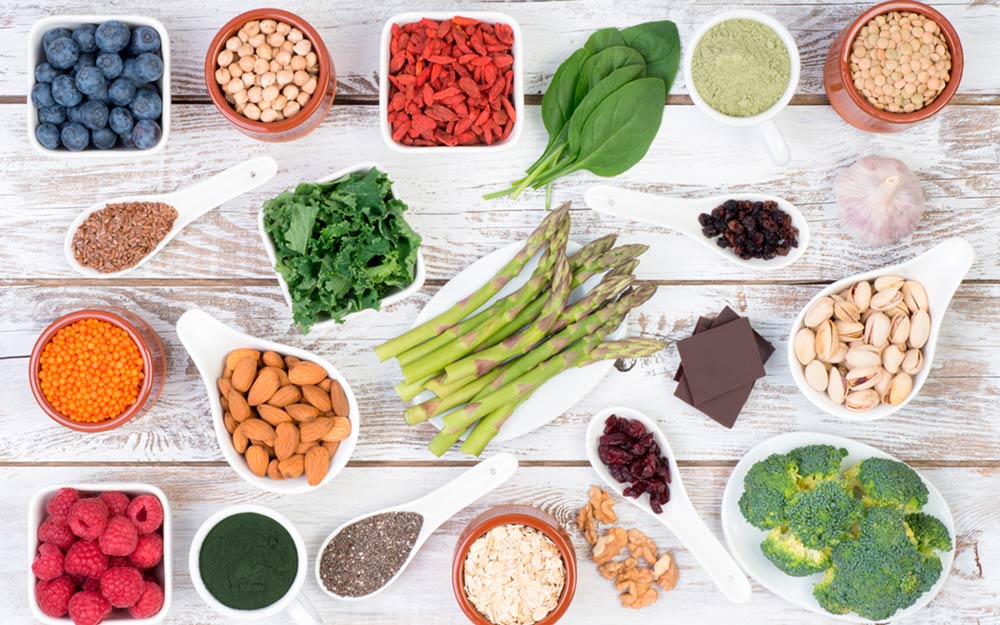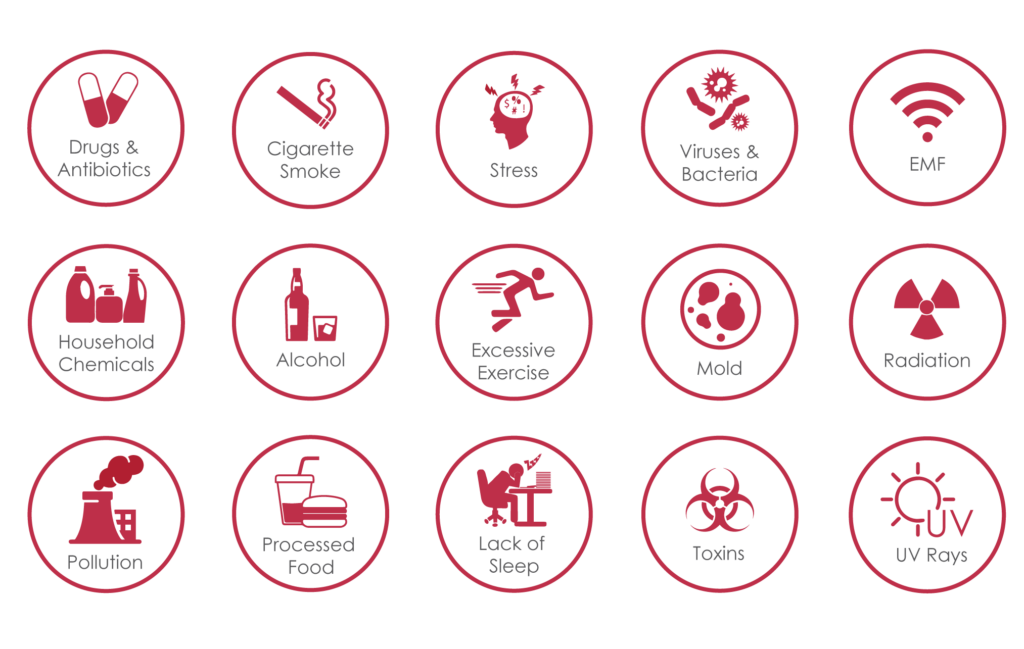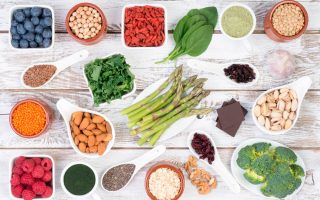Anti-depression diet?
Depression can have different and multiple causes. Poor nutrition in combination with psychological stress is the cause in most cases. Addressing psychological stress with nutrition works to a certain extent, especially if the stress enters the subconscious through fear. To fully tackle the fear in the subconscious, we provide help in the form of trip therapy. Nutrition does address the basics so that depression can be better combated and in some cases the depression can be completely resolved. If the diet is correct, the neurotransmitters in the brain will restore balance and that provides a basis for more positive thoughts.

Most diets focus on the body. It is mainly about losing weight as quickly as possible and whether this is done in a healthy or unhealthy way is often secondary to the optical result or what the scale says.
The nutritional advice below is written to help you feel better about yourself. The effect is mainly on the brain, but the body also benefits from it. One cannot exist without the other, because the brain is also an organ of the body. This nutritional advice is more of a guideline than a detailed diet. We give you the ingredients that you have to combine yourself, but the nice thing is that you will notice a difference within a few days.
Free radicals
When you breathe, your body fills with oxygen, which the mitochondria (the powerhouses of your cells) use to make fuel for the body. They leave behind free radicals, the part of the oxygen they cannot use. This oxygen is very reactive and wants to combine with anything and then oxidize (like iron rusts).
A few free radicals are good; they destroy damaged cells so you can replace them. But excess free radicals begin to attack strong cells, causing inflammation and causing premature aging. Chronic stress, toxins from smog and low-quality indoor air, mold, sugar, pesticides and many other trappings of modern life produce high levels of free radicals, reducing the release of serotonin and BDNF in the body, causing depression or anxiety. even depression.
More info about BDNF and serotonin

Polyphenols against free radicals
All vegetables contain polyphenols that neutralize free radicals and prevent them from causing damage. Low inflammation increases blood flow to your brain, giving it the oxygen to produce more energy. Increased blood flow gives you stable energy and focus. Polyphenols also help you make more BDNF (Brain-derived neurotrophic factor), a protein that ensures neurogenesis. Neurogenesis ensures that you build new brain cells.
Dark green vegetables are a good source of polyphenols. For an extra anti-inflammatory boost, add dark red, purple and blue plants. They often have the strongest polyphenols in the largest amounts. Here are some of the most powerful polyphenol sources:
Coffee contains special polyphenols that protect high fat cells and the brain is made up of some of the fattest cells in your body. Coffee is strongly neuroprotective. Coffee should be drunk in moderation and no later than 1:00 PM in connection with sleep. More than two cups of coffee a day will actually be detrimental to your health, so drink in moderation.
Green tea contains theanine and catechins, both of which prevent cognitive decline. Theanine also improves attention and mood when you combine it with caffeine, so take your green tea with caffeine. You won't find green polyphenols in coffee. Drink a cup of each for extra cognitive performance in the morning.
Blueberries get their deep blue color from anthocyanins, powerful polyphenols that increase blood flow and drastically extend lifespan in animals. Blueberry polyphenols also directly increase BDNF, helping you create new brain pathways. Blueberries are quite low in sugar, but they still have a few grams, so stick to two handfuls per day.
Pomegranates contain ellagitannins, special polyphenols that go directly into your mitochondria and protect them from damage. Moreover, you break intestinal bacteria pomegranate in something called urolithins, which can protect the brain against cognitive decline. Stick to a few handfuls of pomegranate seeds per day. Avoid ready-made juices with pomegranate, which contain more sugar and much less polyphenols.
Red cabbage contains anthocyanidins that are particularly powerful in combating inflammation. They give red cabbage its color; white or green cabbage does not have the same powerful effect.
ORAC list. The ORAC list contains foods with a lot of antioxidants. Antioxidants freely absorb oxygen and thus also prevent inflammation.
Good fats. Most polyphenols are fat-soluble, so make sure you get them with a good dose of good fats, which we'll write about more below.
Saturated fat to keep your brain cells insulated
The brain contains approximately 60% of fat, of which 25% is cholesterol. If you've ever been on a low-fat diet and always felt tired or unfocused, now you know why: You're starving the brain of one of its most important components.
Brain cells send signals to each other along long nerve cell connections. Many of the nerve cell connections are covered with myelin sheaths, fatty coatings that insulate your brain cells so that electrical signals travel through your brain more quickly. It is similar to the way electricity travels through an insulated wire.
As myelin begins to break down, electrical communication in the brain slows down. That is the moment when people forget keys and lose their train of thought. Myelin is made almost entirely of cholesterol. Cholesterol is also the basis for all sex hormones: testosterone, estrogen, cortisol (which is needed in healthy amounts), and so on. Give the body enough cholesterol to work with and it will balance the hormones.
Too many carbohydrates should not be eaten in addition to saturated fat. Carbohydrates, especially the fast sugars, cause oxidative inflammation that ultimately causes cardiovascular disease (oxidized LDL and saturated fats). In other words, it's the inflammation from excess sugar that weakens the heart, not just the saturated fat. A low-carb (mainly low-sugar), anti-inflammatory diet is ideal for most people.
Best sources of saturated fat and cholesterol
Grass-fed butter. Note the sunny yellow color and creamy consistency. White or waxy butter is a sign that the cow that produced it was eating a poor diet, which means the butter is also not of good quality.
Eggs. Free-range, grass-fed and omega 3 eggs are the best choice. Avoid eggs from grain-fed chickens.
Dark chocolate. Beware of added sugar. The darker the better. The best is as unprocessed as possible, such as cacao nibs. Chocolate is also full of polyphenols.
Grass-fed beef and lamb. Go for the fattiest minced meat available. It is usually the cheapest because most people think fat is bad, but with grass-fed beef and lamb that is not the case.
Omega-3s against inflammation and brain structure
There are two types of omega-3s that are very good for the brain. Eicosapentaenoic acid (EPA) competes with omega-6 fats, reducing inflammation throughout the body and especially your brain. Docosahexaenoic acid (DHA) is the main structural component of your brain and central nervous system. In fact, there is strong evidence that high-DHA diets played a major role in the evolution of the modern human brain.
DHA is one of the most important factors in sharp memory and brain cell integrity. It is also essential for mood: a global study on fish consumption, DHA levels and depression showed that eating more DHA-rich fish strongly correlates with greater happiness. It is not a proven cause-and-effect relationship, because the connection could also be the other way around, namely that happy people eat more fish.
The third type of omega-3 is alpha-linolenic acid (ALA), this omega-3 occurs in plants. The body cannot use ALA, so it converts it to DHA and EPA, but the conversion is inefficient. You only convert about 6% from ALA to DHA/EPA. All those superfood companies claiming that their plant-based products are high in omega-3 are using misleading marketing; With the exception of a few types of algae, plants only contain ALA, which doesn't actually do you much good. Get your omega-3s from animal fats (or algae, if you're vegetarian/vegan).
Here are top sources of omega-3 fatty acids (DHA and EPA):
Wild-caught, low-mercury fish. Alaska salmon, anchovies, sardines, mackerel and trout are all good sources. Make sure they are wild caught and if you get them canned, check that the cans are BPA free.
Fish/krill oil. Krill oil tends to be a bit better, but it's also more expensive.
Grass-fed organ meats also contains many omega-3 fatty acids. Brains are by far the best source. Avoid cow brain due to history with mad cow disease, but lamb brain is excellent if you can find it. Heart, liver and kidneys also contain a lot of DHA and EPA. Make sure your organ meats are grass-fed.
What else can you eat?
We have previously written about how you can produce more BDNF through diet and lifestyle and thus combat depression. We recommend that you read the section on nutrition. You can combine the nutritional advice contained therein with the information in this article. This information together is a very good basis for a healthy body and mind.
Read more about this here nutrition, BDNF and depression
Supplements
Supplements can be a welcome addition to your diet. We've written about this before.
Read here which supplements work against depressive symptoms
Other things to consider
Including the above foods in your diet is a solid foundation for a fast, resilient brain that is more resistant to depression. This article covers the tip of the iceberg: you can stimulate your brain even more by eating even fewer carbohydrates and more healthy fat and intermittent fasting. Fasting can have a cleansing effect. Even part-time fasting works. Eating alone between 12:00 and 18:00 for a few weeks can make a greater improvement.
Citation
https://www.ncbi.nlm.nih.gov/pubmed/19249420
https://www.ncbi.nlm.nih.gov/pubmed/16507475
https://www.ncbi.nlm.nih.gov/pubmed/19772322
http://www.crcnetbase.com/doi/abs/10.1201/9781420028096.ch17
https://www.jstage.jst.go.jp/article/jphs/91/4/91_4_267/_article
http://www.nejm.org/doi/full/10.1056/NEJMoa1112010#t=article
http://naturamedica.lt/wp-content/uploads/2015/07/Rodriguez-Mateos-Am-J-Clin-Nutr-2013.pdf
https://www.ncbi.nlm.nih.gov/pmc/articles/PMC1413581/
https://www.ncbi.nlm.nih.gov/pubmed/18681988
https://www.ncbi.nlm.nih.gov/pmc/articles/PMC3665790/
https://www.researchgate.net/publication/8344531_Bioavailability_of_ellagic_acid_in_pomegranate_Punica_granatum_L_juice
https://www.ncbi.nlm.nih.gov/pubmed/24907980
https://www.ncbi.nlm.nih.gov/pubmed/15812120
https://www.sciencedaily.com/releases/2015/12/151209135740.htm
http://www.ocl-journal.org/articles/ocl/pdf/2004/01/ocl2004111p30.pdf
http://journals.plos.org/plosone/article?id=10.1371/journal.pone.0120391
http://www.thelancet.com/journals/lancet/article/PIIS0140-6736(05)79168-6/fulltext
http://www.dhaomega3.org/Overview/Conversion-Efficiency-of-ALA-to-DHA-in-Humans
